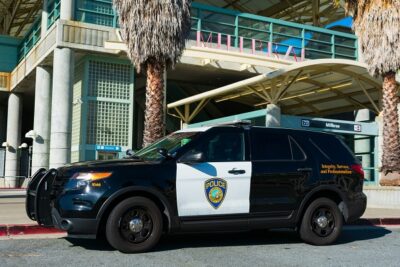Working to Realize Carbon-Free Future for Regional Ferry Service
In addition to providing fast, convenient service that connects the region, activates our waterfront and strengthens our economic competitiveness, San Francisco Bay Ferry is also focused on doing it with clean, carbon-free vessels. This week, Bay Area Council CEO Jim Wunderman (above, left), who serves as Chair of SF Bay Ferry operator the Water Emergency Transportation Authority, joined SF Bay Ferry Executive Director Seamus Murphy (above, right) on a trip to Lisbon, Portugal, where Murphy got a first-hand look at an electric ferry, the two of them met with marine industry leaders on the latest in clean-vessel trends and technologies, and Wunderman spoke at the 11th Annual World Ocean Summit hosted by The Economist on SF Bay Ferry’s plans. The Council was instrumental in the creation of SF Bay Ferry and has been a strong advocate for investing in growing the system.
At the World Ocean Summit, Wunderman joined a panel of leading clean-vessel experts and shared SF Bay Ferry’s plans over the next few years to replace many of its diesel-powered vessels with electric boats as part of its Rapid Emission-free Electric Ferry (REEF) program . In advance of making this transition, SF Bay Ferry has already transitioned to 100% renewable diesel engines, making the system the cleanest ferry system in the U.S. Under REEF, Wunderman told the audience, SF Bay Ferry has already raised $400 million to procure five battery-electric ferries, with the first vessel currently scheduled to arrive in early 2026. Wunderman also described plans for building the onshore charging infrastructure to power the system, including using microgrid battery platforms at seven terminals across the region to rapidly juice up vessels throughout the day.
Finally, Wunderman outlined a bold vision for launching a new era of maritime industry leadership in the Bay Area built around clean, carbon-free vessels. At one time the world’s global center for shipbuilding, the Bay Area’s maritime industry has shrunk dramatically over the past 70 years. With growing interest globally in clean-powered vessels to support a wide range of applications, reviving the Bay Area’s maritime industry could usher in new jobs, investment and economic opportunity along the region’s waterfront.
Also, during the trip, Murphy and Wunderman met with leaders of Transtejo, Lisbon’s ferry operator. And, Murphy got an inside look at the first of 10 battery electric-powered vessels Transtejo has ordered to better understand what is involved in building and maintaining the infrastructure needed to effectively, reliably and affordably operate a clean-vessel fleet. To engage in the Council’s waterfront mobility policy work, please contact Vice President Emily Loper.





